With their towering stature and commanding presence, the Great Dane is a breed that exudes an air of magnificence. Heralded as gentle giants, these dogs possess a remarkable blend of strength and amiability.
But beneath their regal exterior lies a wealth of fascinating information and characteristics waiting to be uncovered. From their origins in Germany to their adaptability to apartment living, there is much to discover about these majestic creatures.
So, prepare to embark on a journey of exploration as we delve into the captivating world of Great Dane dog breed.
Key Takeaways
- Great Danes are gentle giants known for their impressive size and strength.
- They have a friendly and affectionate nature, making them good companions for children and other pets.
- Regular veterinary check-ups, proper diet, and exercise are important for their overall health and well-being.
- Early socialization and training, as well as regular exercise and mental stimulation, are crucial for their development.
Origin and Breed Group
The Great Dane is a dog breed that originated in Germany and belongs to the working group. Known for its impressive size and strength, the Great Dane is a breed that commands attention.
Standing at 30-34 inches tall at the shoulder and weighing between 140-175 pounds, these dogs are truly giants among canines. They've a sleek, muscular build and a short coat that comes in various colors.
Despite their intimidating appearance, Great Danes have a gentle and friendly temperament. They're good with children, get along well with other dogs and pets, and are known for their loyalty and sociability. However, due to their size, early socialization and training are crucial.
Great Danes are prone to certain health issues, such as hip dysplasia, bloat, and heart problems. Regular veterinary check-ups, a proper diet, and regular exercise are important for their overall well-being.
Despite their large size, Great Danes can adapt well to apartment living, as long as their energy levels and behavior are taken into consideration. It's important to create a harmonious living environment for everyone involved.
Lifespan and Size
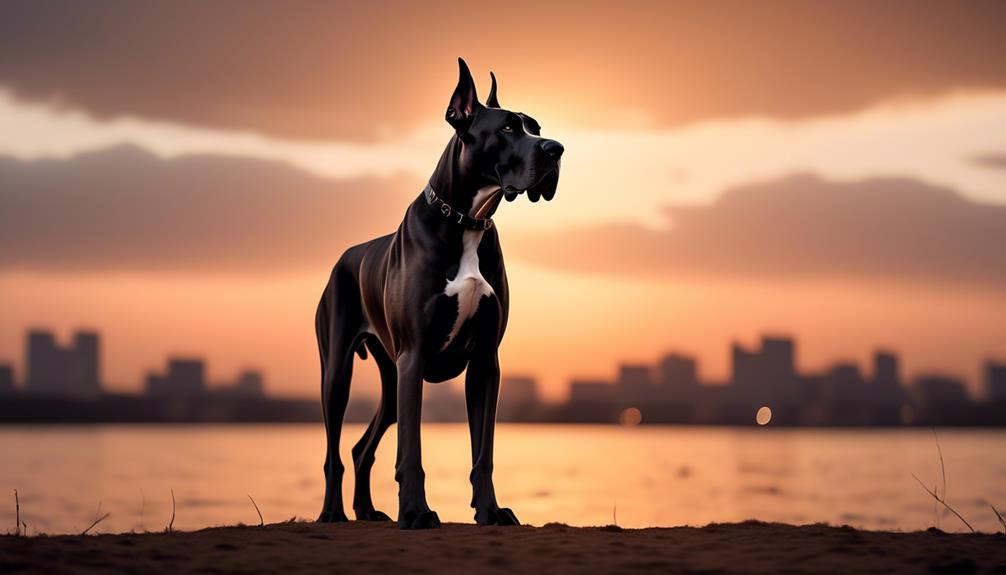
With a lifespan of 8-10 years and a size that can reach up to 34 inches tall at the shoulder and weigh between 140-175 pounds, the Great Dane is truly an impressive breed. This majestic dog stands out not only for its size but also for its sleek, muscular build and short coat that comes in various colors.
Great Danes have a gentle and affectionate nature, making them good companions for families with children. They're also friendly towards other dogs and pets, displaying loyalty and sociability. However, potential owners should be aware of certain health considerations such as hip dysplasia, bloat, and heart problems.
Regular veterinary check-ups, a proper diet, and regular exercise are crucial for their well-being. Given their size, early socialization and training are important to ensure they're well-behaved and manageable.
Appearance and Coat Colors
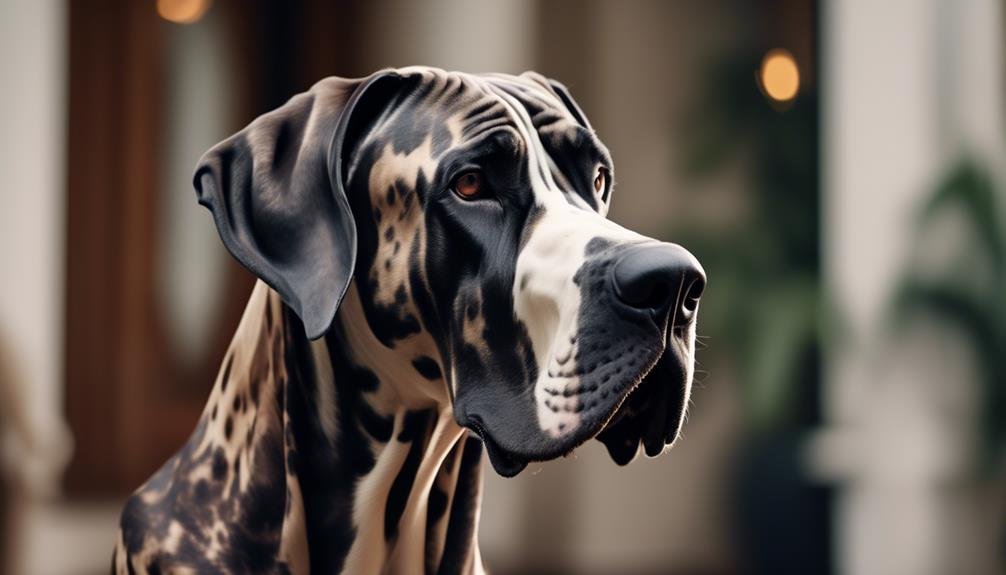
Great Danes are known for their impressive appearance and come in a variety of coat colors. These dogs have a sleek and muscular build, making them stand out wherever they go. Their short coat is smooth and glossy, requiring minimal grooming. Great Danes can have a wide range of coat colors, adding to their unique charm. Here is a table showcasing some of the common coat colors seen in Great Danes:
| Coat Color | Description |
|---|---|
| Fawn | Light tan with a black mask on the face |
| Brindle | A mix of fawn and black stripes |
| Harlequin | White base coat with irregular black patches |
| Black | Solid black coat |
| Blue | Grayish-blue color |
These coat colors can vary in shades and patterns, making each Great Dane truly one-of-a-kind. Whether it's the elegance of a fawn Dane or the striking patterns of a harlequin, their appearance is sure to turn heads.
Temperament and Gentle Nature
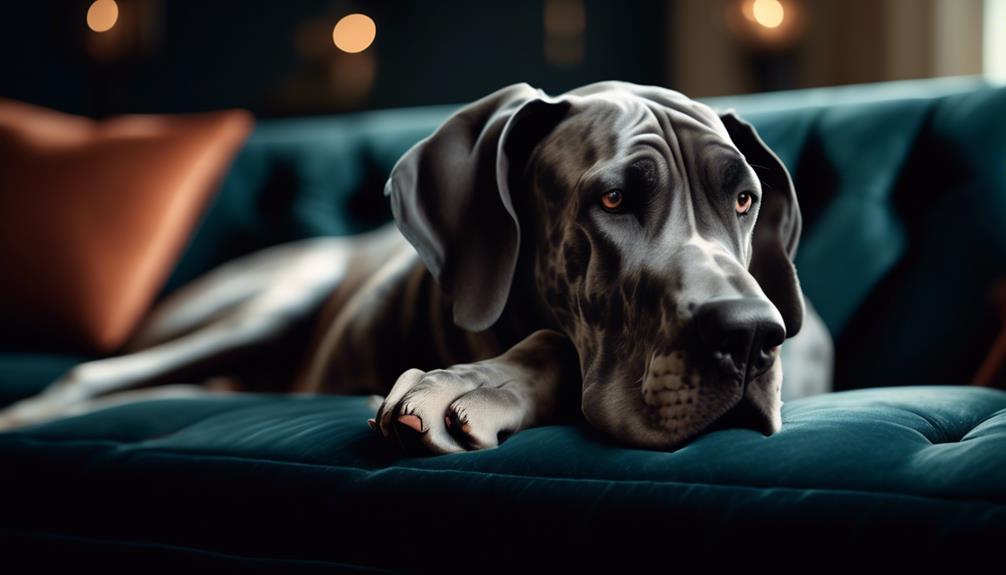
After exploring the impressive appearance and coat colors of Great Danes, it's important to delve into their temperament and gentle nature.
Great Danes are often referred to as gentle giants due to their friendly, affectionate, and gentle nature. They're known to be good with children and are generally friendly towards other dogs and pets.
Great Danes are also loyal and sociable, making them great companions. Their calm and patient temperament makes them suitable for families and individuals alike.
Despite their large size, Great Danes are known to be gentle and loving, making them excellent family dogs. Their gentle nature combined with their imposing stature makes them truly unique and special.
Compatibility With Children and Other Pets
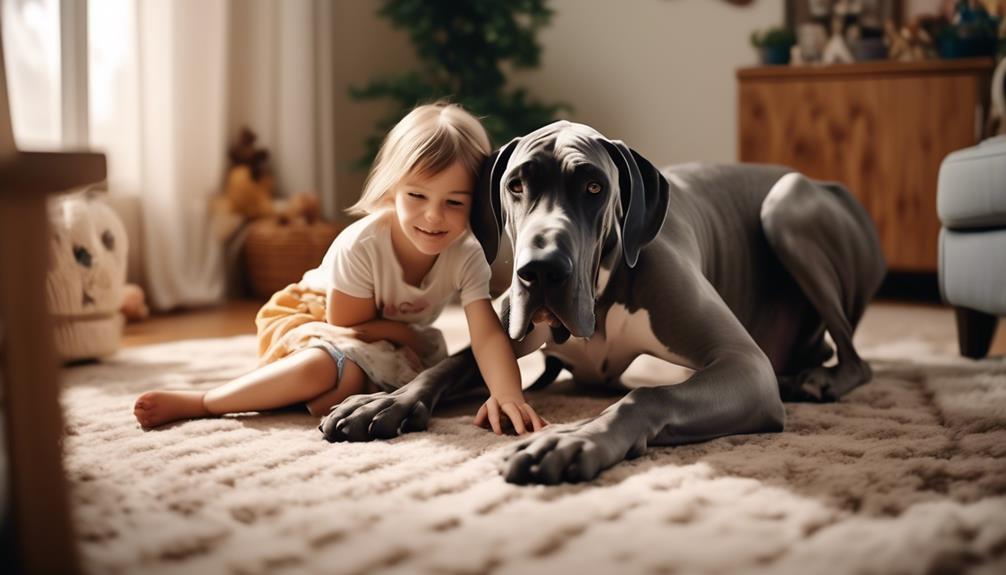
Families and individuals can feel confident in choosing a Great Dane as a pet, as they are highly compatible with children and other pets. These gentle giants have a friendly and affectionate nature, making them excellent companions for kids. Great Danes are known for their patience and tolerance, and they often form strong bonds with children, acting as their protectors. They are also sociable and get along well with other dogs and pets. To provide a better understanding of their compatibility, here is a table highlighting the Great Dane's interactions with children and other pets:
| Children | Dogs | Other Pets |
|---|---|---|
| Excellent | Good | Good |
| Patient | Friendly | Friendly |
| Protective | Sociable | Tolerant |
With their calm and gentle demeanor, Great Danes can bring joy and companionship to both children and other pets, making them a wonderful addition to any family.
Loyalty and Sociability
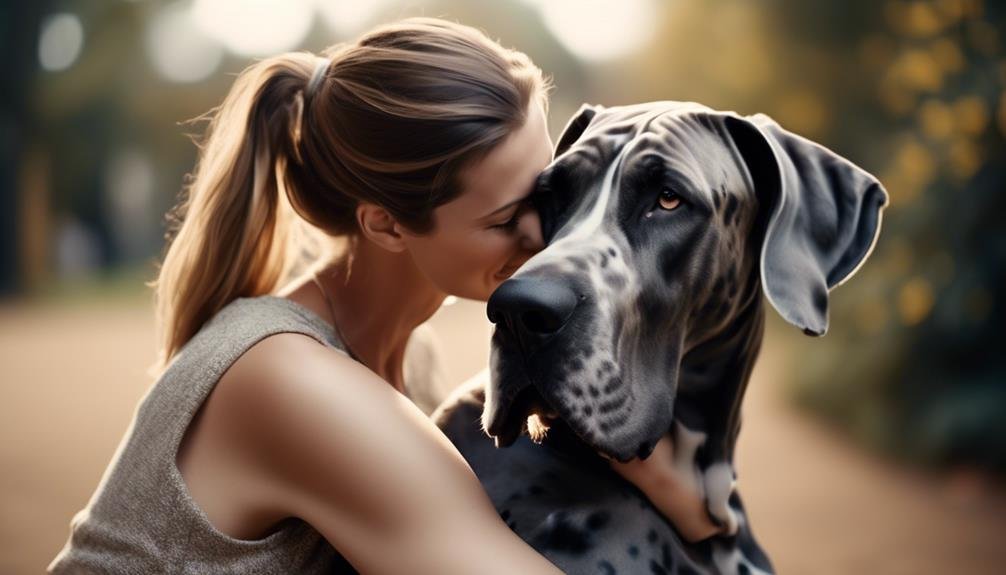
With their unwavering loyalty and sociable nature, Great Danes make exceptional companions for individuals and families alike. They're known for their affectionate and gentle nature, making them great with children and other pets.
Here are some key qualities that highlight their loyalty and sociability:
- Devoted companions: Great Danes form strong bonds with their owners and are known to be fiercely loyal. They'll always be by your side, providing comfort and love.
- Friendly and welcoming: These gentle giants are generally friendly towards strangers, making them great pets for social gatherings and outings.
- Playful and sociable: Great Danes enjoy the company of other dogs and pets, often engaging in playful interactions. Their sociable nature makes them easy to introduce to new friends.
- People-oriented: Great Danes thrive on human companionship and love being a part of family activities. They're happiest when they're included in daily routines and given plenty of attention and affection.
Health Considerations and Common Issues
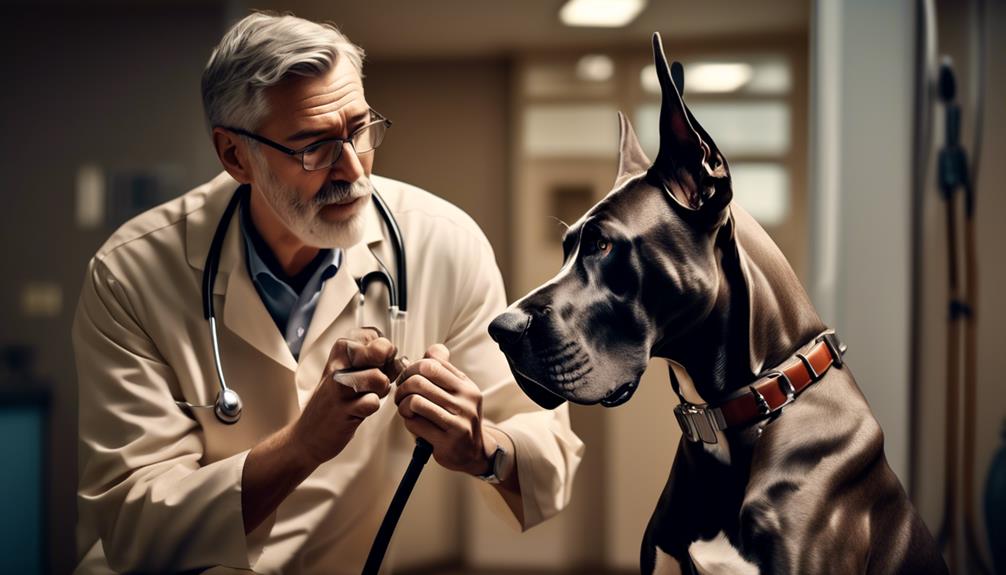
One must be mindful of the health considerations and common issues that Great Danes may face throughout their lives. Great Danes are prone to certain health conditions, including hip dysplasia, bloat, and heart problems. Regular veterinary check-ups are important to monitor their health and catch any potential issues early on. Proper diet is crucial for their well-being, as they require a balanced and nutritious meal to maintain optimal health. Exercise is also necessary for their overall well-being, as it helps to keep them mentally and physically stimulated. Early socialization and training are important due to their size, as it is crucial for them to be well-behaved and obedient. By being aware of these health considerations and taking proactive measures, owners can ensure that their Great Danes live long and healthy lives.
| Common Health Issues | Description |
|---|---|
| Hip Dysplasia | A common condition in large breeds like Great Danes, hip dysplasia is a malformation of the hip joint. It can cause pain, lameness, and difficulty in mobility. Regular exercise and weight management can help reduce the risk and severity of hip dysplasia. |
| Bloat | Great Danes are prone to bloat, a condition characterized by the stomach twisting or filling with gas. It is a life-threatening emergency that requires immediate veterinary attention. Feeding them smaller, frequent meals and avoiding vigorous exercise after eating can help prevent bloat. |
| Heart Problems | Great Danes are susceptible to various heart conditions, including dilated cardiomyopathy and mitral valve disease. Regular cardiac screenings and monitoring can help detect and manage these conditions early on. |
| Gastric Torsion | Also known as twisted stomach, gastric torsion is a serious condition where the stomach rotates on its axis. It can be caused by factors like overeating, exercise after eating, and stress. Immediate veterinary intervention is necessary to save the dog's life. |
| Cancer | Great Danes have a higher risk of developing certain types of cancer, such as osteosarcoma and lymphoma. Regular check-ups, early detection, and prompt treatment can improve the prognosis and quality of life for affected dogs. |
Importance of Regular Veterinary Check-ups
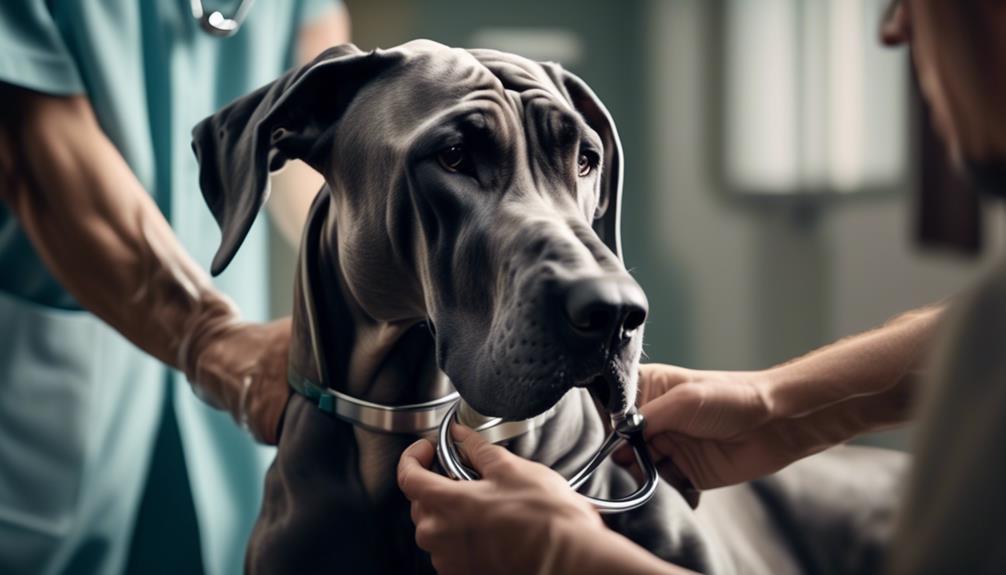
To ensure the well-being and longevity of Great Danes, regular veterinary check-ups are crucial. These check-ups play a vital role in maintaining the health and happiness of these gentle giants.
Here are some reasons why regular veterinary check-ups are important for Great Danes:
- Early detection of health issues: Regular check-ups allow veterinarians to identify any potential health problems at an early stage, increasing the chances of successful treatment.
- Prevention and vaccination: Vaccinations are essential for protecting Great Danes against common diseases. Regular check-ups ensure that they receive the necessary vaccinations and preventive treatments.
- Dental care: Great Danes are prone to dental issues. Regular check-ups help in monitoring their dental health and addressing any oral hygiene issues.
- Nutritional guidance: Veterinarians can provide valuable dietary advice tailored to the specific needs of Great Danes, ensuring they receive optimum nutrition for their overall well-being.
Essential Diet and Nutrition
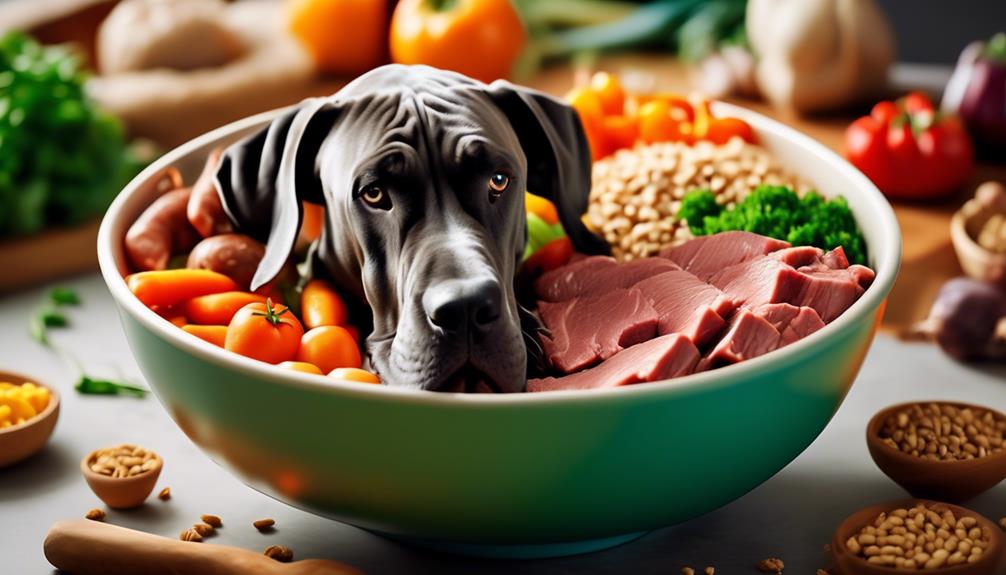
Regular veterinary check-ups provide important guidance on the essential diet and nutrition for Great Danes, ensuring their overall health and well-being. Great Danes are large and active dogs that require a balanced diet to support their growth, energy levels, and overall health. A high-quality, commercially prepared dog food that's specifically formulated for large breeds is recommended. This diet should contain a proper balance of protein, fats, carbohydrates, vitamins, and minerals.
It's important to feed Great Danes multiple small meals throughout the day to reduce the risk of bloat, a condition that they're prone to. Additionally, it's important to monitor their weight and adjust their food intake accordingly to prevent obesity, which can lead to joint problems. Providing fresh water at all times is also essential for their hydration.
It's advisable to consult with a veterinarian to determine the best diet and feeding schedule for your Great Dane.
Exercise Requirements for Great Danes
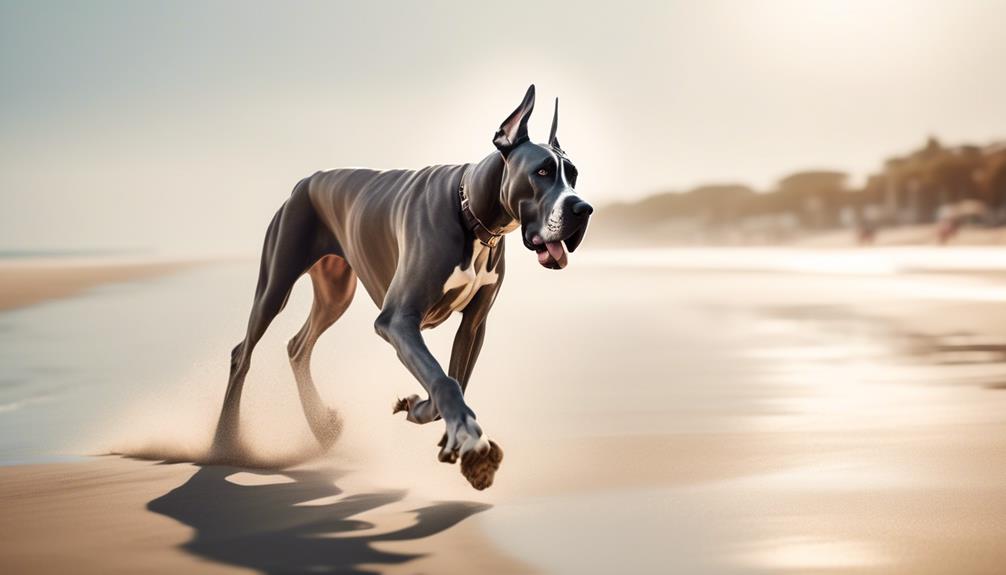
Exercise is crucial for maintaining the health and vitality of Great Danes. These gentle giants may have a calm demeanor, but they still require regular physical activity to stay happy and healthy. Here are some important things to know about the exercise requirements of Great Danes:
- Daily walks: Great Danes should be taken for daily walks to help them burn off energy and keep their muscles toned.
- Limited running: While Great Danes have a lot of power and strength, they're prone to joint problems. Therefore, it's important to limit high-impact activities like running and jumping.
- Mental stimulation: In addition to physical exercise, Great Danes also need mental stimulation. Engage them in activities like puzzle toys or obedience training to keep their minds sharp.
- Swimming: Swimming is a great low-impact exercise option for Great Danes, as it helps to strengthen their muscles without putting stress on their joints.
Early Socialization and Training Tips
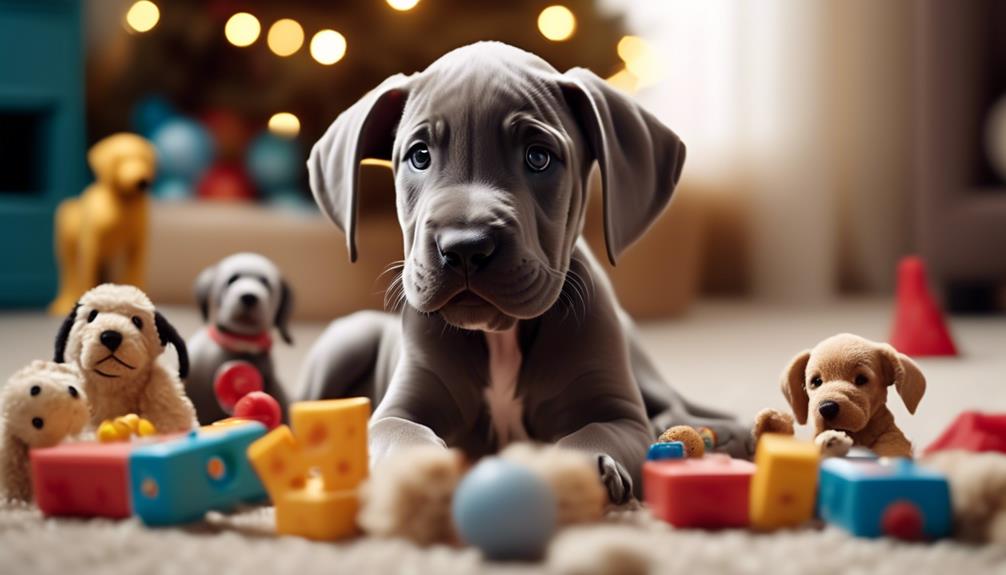
Maintaining the health and well-being of Great Danes goes beyond their exercise requirements, and early socialization and training play a crucial role in their development. Socializing a Great Dane from an early age helps them become well-adjusted, confident, and friendly dogs. It is important to expose them to various people, animals, and environments to prevent fear or aggression issues later in life. Training should start early as well, focusing on basic obedience commands such as sit, stay, and come. Consistency and positive reinforcement methods work best with Great Danes, as they are sensitive and intelligent dogs. With proper socialization and training, Great Danes can grow into well-behaved and sociable companions.
| Early Socialization Tips | Training Tips |
|---|---|
| Start socializing early | Be consistent |
| Expose to various people, animals, and environments | Use positive reinforcement |
| Prevent fear or aggression issues | Keep training sessions short and frequent |
| Encourage confidence and friendliness | Seek professional help if needed |
History and Fun Facts About Great Danes
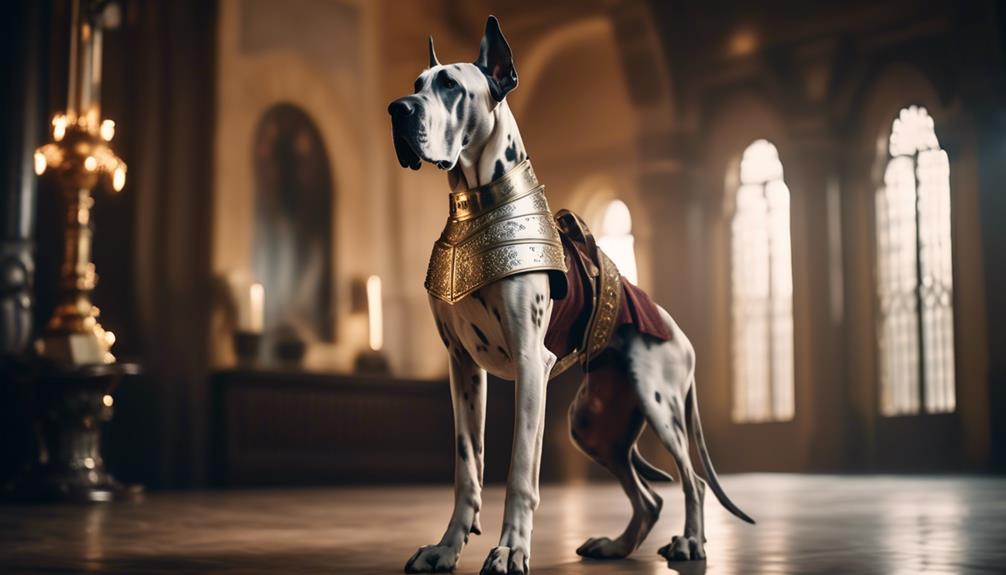
Great Danes have a rich history and fascinating fun facts that highlight their remarkable stature and endearing nature. Originally bred for hunting and guarding, Great Danes have a long history dating back to ancient Egypt. Over time, they transitioned into companion animals and were valued for their loyalty and gentle nature. The name 'Great Dane' actually comes from the French name 'Grand Danois,' which means 'Great Danish.' Great Danes are often referred to as the 'Apollo of Dogs' due to their majestic appearance and noble demeanor.
These fun facts about Great Danes showcase their historical significance and the admiration they've garnered throughout the years. Whether it's their origins as skilled hunters, their transition into beloved companions, or their regal presence, Great Danes continue to captivate the hearts of dog lovers worldwide.
Frequently Asked Questions
Are Great Danes Good Guard Dogs?
Great Danes are not typically considered good guard dogs due to their friendly and sociable nature. While their size may be intimidating, they are more likely to greet strangers with enthusiasm rather than provide protection.
How Much Exercise Do Great Danes Need on a Daily Basis?
Great Danes require regular exercise to maintain their overall health and prevent weight gain. A daily routine of at least one hour of physical activity, such as walks or playtime, is recommended.
Can Great Danes Be Left Alone for Long Periods of Time?
Great Danes should not be left alone for long periods of time, as they thrive on companionship. Their loyal and sociable nature makes them prone to separation anxiety. It is important to provide them with regular interaction and stimulation to prevent behavioral issues.
Are Great Danes Prone to Separation Anxiety?
Yes, Great Danes are prone to separation anxiety. They form strong bonds with their owners and can become distressed when left alone for long periods of time. Proper training and gradual desensitization can help alleviate this issue.
Do Great Danes Have Any Specific Grooming Needs?
Yes, Great Danes have specific grooming needs. Regular brushing to prevent matting, occasional baths, and nail trimming are important. Their ears should be checked and cleaned regularly, and dental care is essential for their overall health.
What are the main differences between Great Dane and Great Pyrenees dog breeds?
Great Dane and Great Pyrenees dog breeds have distinct differences. Great Pyrenees dog characteristics include being loyal, gentle, and independent, with a thick double coat. Great Danes, on the other hand, are known for their massive size and friendly nature. Both breeds make wonderful family pets, but their traits set them apart.
Conclusion
In conclusion, Great Danes are remarkable dogs that combine impressive size with a gentle and sociable nature. Their sleek build and various coat colors add to their appeal as gentle giants.
However, it's important to note their health considerations, such as hip dysplasia and bloat, and to provide them with proper care and regular veterinary check-ups.
With early socialization, training, and a balanced diet, Great Danes can thrive as beloved companions, whether in an apartment or a larger living space.




